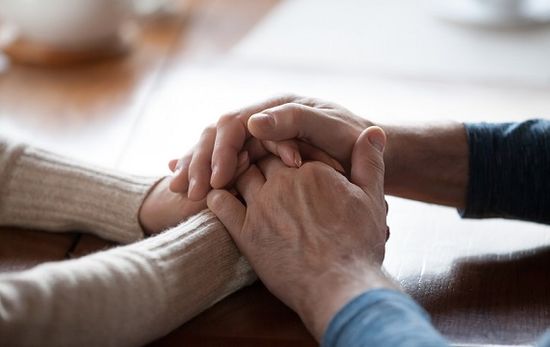There’s no perfect script for these conversations, and that’s okay. What matters most is being present—offering your time, your care, and your willingness to sit with their emotions. These moments often open the door to deeper discussions, including practical topics like arranging a funeral.
This guide is written to help you navigate these moments. It’s not about giving you a list of things to say, but about helping you approach the conversation with authenticity, courage, and love.
Before you even say a word, you may feel overwhelmed by your own emotions. That’s normal. Talking to someone about their final days isn’t something we’re naturally prepared for—it feels unnatural, even terrifying.
Take a moment to acknowledge how you’re feeling. Are you afraid of breaking down? Worried you’ll upset them? These fears are valid, but they shouldn’t hold you back. The most meaningful thing you can do is to show up, imperfections and all.
You might start simply. Sit down beside them, hold their hand if they’re comfortable with it, and say something like:
“I’ve been thinking about you a lot, and I just wanted to spend some time together.”
That’s it. You don’t need grand gestures or profound statements. The conversation doesn’t need to be perfect—it just needs to be real.
Tips for starting the conversation:
If you’re struggling with your own emotions during this time, it’s important to find ways to process your feelings. Articles like how to prepare for the death of a loved one can provide helpful guidance and strategies for managing this difficult period.
When words feel insufficient, listening becomes your greatest gift. People nearing the end of life often just want someone to be there—to truly hear them without trying to fix or sugar-coat anything.
Try not to fill the silences. Let them guide the conversation, even if it’s not about the serious things you think you should discuss. They may want to talk about their favourite memories, ask questions about what you’ve been up to, or even share their fears.
Encourage them to share their honest emotions. Let them know it’s okay to feel however they’re feeling—whether that’s sadness, anger, acceptance, numbness, or even moments of calm.
You might say something like:

“It’s okay to feel whatever you’re feeling right now. If you’re angry, sad, or even if you don’t feel much at all, that’s okay. I’m here for you.”
When they do open up, avoid jumping in with reassurances like, “Don’t worry, everything will be fine,” or platitudes such as, “You’re so strong.” Instead, reflect back their feelings. You might say: “That sounds really hard. I’m so glad you’re sharing this with me.”
Sometimes, just being there and listening without judgement is the most comforting thing you can do.

It’s easy to overthink what to say in moments like these. But more often than not, the most meaningful things are the simplest. If there’s something you’ve been meaning to say—how much they’ve meant to you, how much you’ll miss them—don’t wait for the perfect moment.
Here are some examples of what you might say:
These words don’t need to be polished. They just need to come from the heart. If you find yourself getting emotional, that’s okay too. Tears are just a part of being human.
If they bring up their own mortality, it can feel like the air’s been sucked out of the room. But it’s important not to shy away from these conversations. If possible, make it clear that you’re ready to listen and support them. Sometimes, just acknowledging the reality of the situation can be a relief.
You might say:
“I know the end is nearing, and I want to be here for you in any way you need. Please tell me how I can support you.”

Here are some talking points to consider:
Even with the best intentions, some words can come across as unhelpful. Avoiding these common pitfalls can make your conversations more meaningful:
Instead, focus on being honest and open to their perspective. It’s okay to admit, “I don’t know what to say, but I’m here.”
While the focus should always be on their emotional and physical comfort, discussing their practical wishes can also be part of the process. Some people find peace in knowing their preferences will be respected, whether that’s a simple memorial or an affordable option like direct cremation.
Timing is everything—choose a moment when they seem calm and comfortable, and let the conversation unfold naturally. You might say:
“Have you thought about what you’d like your funeral or memorial to be like? I want to make sure it reflects your wishes.”
They might want a traditional service, a private family gathering, or a simpler choice like direct cremation. If they’re unsure, offer reassurance that there’s no right or wrong answer—it’s about what feels right to them.
Planning ahead can provide peace of mind for both you and your loved ones during this difficult time. A funeral plan ensures that your wishes are honoured and relieves the burden of decision-making from those you care about most.
Take the first step today by exploring our funeral plans. Whether you’re looking for a simple, affordable option or a more traditional service, we’re here to help you find the plan that’s right for you.
Learn more about our funeral plansIn the end, what you say to someone who is dying doesn’t need to be polished or rehearsed. It’s your willingness to sit with them, to share your heart, and to let them be fully themselves that will matter most.
Be kind to yourself as well. These conversations are never easy, but they’re a profound act of love. Showing up, however imperfectly, is what truly counts.

Preparing for a loved one’s death can feel overwhelming. This guide offers practical advice and emotional support to help you navigate this difficult time with compassion and clarity.
Preparing for the death of a loved one
Starting a conversation about death isn’t easy, but it’s an essential step in honouring a loved one’s wishes. Learn how to approach this sensitive topic with care and understanding.
Talking about death
Grieving before a loss occurs is a natural part of the process when you're anticipating a death. Discover what anticipatory grief is and explore ways to cope with the emotions it brings.
Anticipatory grief: what is it?We offer the highest level of support, but don't just take our word for it. Below are recent reviews from customers who bought a funeral with us.





